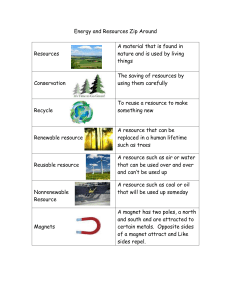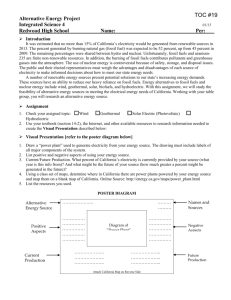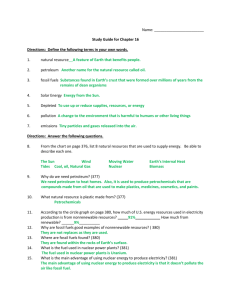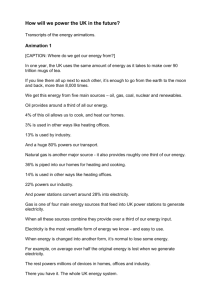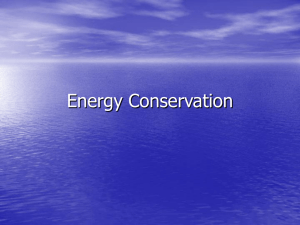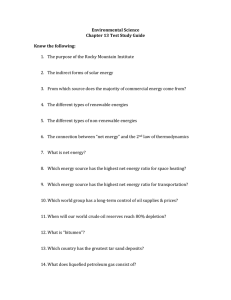Generating Electricity
advertisement
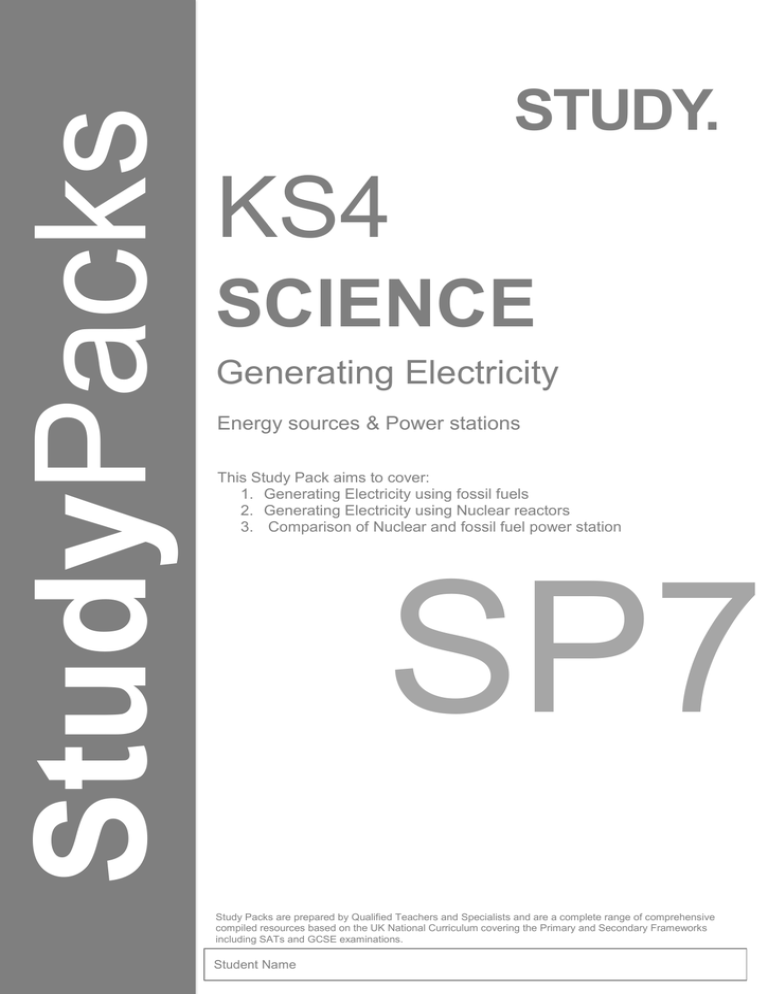
StudyPacks STUDY. KS4 SCIENCE Generating Electricity Energy sources & Power stations This Study Pack aims to cover: 1. Generating Electricity using fossil fuels 2. Generating Electricity using Nuclear reactors 3. Comparison of Nuclear and fossil fuel power station SP7 Study Packs are prepared by Qualified Teachers and Specialists and are a complete range of comprehensive compiled resources based on the UK National Curriculum covering the Primary and Secondary Frameworks including SATs and GCSE examinations. Student Name Contents Generating Electricity in power stations notes 2-7 Practice questions 8-15 Exam questions 16-22 Mark scheme 23-27 1 2 3 Conventional power stations About three-quarters of the electricity which is generated in the UK comes from power stations that are fuelled by fossil fuels. Power station There are four main stages: 1. the fuel is burned to boil water to make steam 2. the steam makes a turbine spin 3. the spinning turbine turns a generator which produces electricity 4. the electricity goes to the transformers to produce the correct voltage Power stations generate significant heat losses to the environment. Below is an energy transfer diagram for the generation of electricity from a fossil fuel such as coal: Energy transfer for the generation of electricity from a fossil fuel The National Grid and transformers Transformers A transformer is an electrical device that changes the voltage of an AC supply. A transformer changes a high-voltage supply into a low-voltage one, or vice versa: a transformer that increases the voltage is called a step-up transformer 4 a transformer that decreases the voltage is called a step-down transformer Step-down transformers are used in mains adapters and rechargers for mobile phones and CD players. The National Grid When a current flows through a wire, some energy is lost as heat. The higher the current, the more heat is lost. To reduce these losses, the National Grid transmits electricity at a low current. This requires a high voltage. Power stations produce electricity at 25,000V. Electricity is sent through the National Grid cables at 400,000V, 275,000V and 132,000V. Step-up transformers at power stations produce the very high voltages needed to transmit electricity through the National Grid power lines. These high voltages are too dangerous to use in the home, so step-down transformers are used locally to reduce the voltage to safe levels. Nuclear power stations Nuclear fission is the splitting of an atom's nucleus to release heat. Nuclear power stations use the fission of uranium-235 to heat water. Fossil fuel power stations burn their fuel (coal, oil or gas) to heat their water. Dangerous radioactive waste is sealed in glass-like blocks and buried in rocks. Nuclear fission Calder Hall nuclear power station Fission is the splitting of a large nucleus. When this happens energy is released in the form of heat. Nuclear reactors use the heat released by the fission of uranium. If 1kg of uranium-235 undergoes nuclear fission it can release about the same amount of energy as 2 million kg of coal. The fission of uranium can set up a chain reaction that will keep on releasing energy as long as there are uranium nuclei present. If this chain reaction is allowed to get out of control, energy is released very quickly and the result is a nuclear bomb. Nuclear power stations are designed so that this cannot happen. Higher tier only Uranium-235 is a naturally occurring element which has a special property. When a neutron is absorbed by the nucleus, the new heavier nucleus becomes unstable. It is unable to hold itself together so splits into two smaller nuclei and gives out three neutrons and a burst of energy. 5 A chain reaction involving uranium-235 Nuclear power A power station makes electricity. Fossil fuel (coal, oil and gas) power stations and nuclear (uranium) power stations both use the same processes to make electricity. These are: 1. fuel produces heat and heat is used to boil water and is turned into steam 2. steam turns a turbine 3. turbine turns a generator and the generator makes electricity 4. electricity goes to the transformers to produce the correct voltage The only difference between fossil fuel and nuclear power stations is how the water is heated. Fossil fuel power stations burn their fuel while a nuclear power station uses the fission of uranium to generate heat. Uranium is a non-renewable energy resource. Radioactive waste All nuclear reactors produce radioactive waste. At present the most dangerous waste is sealed in glass-like blocks which are buried deep within rocks. Careless disposal of waste in the past has led to pollution of land, rivers and the ocean. Nuclear reactors As well as producing heat the nuclear reactor can be used to make other materials radioactive. The chain reaction inside the reactor releases neutrons. If a material is put into the reactor some of these neutrons may be absorbed by the nuclei of its atoms. This will make an atom's nucleus unstable which means it has become radioactive. These man-made radioisotopes are often then used as tracers in hospitals to diagnose and treat patients or in industry to detect leaks in pipes. 6 Higher tier only The nuclear reactor is designed to allow a controlled chain reaction to take place. Each time a uranium nucleus splits up it releases energy and three neutrons. If all the neutrons are allowed to be absorbed by other uranium nuclei the chain reaction will spiral out of control causing an explosion. To control the energy released in the reactor moveable control rods are placed between the fuel rods. These control rods are made of boron which absorbs some of the neutrons so fewer neutrons are available to split uranium nuclei. The control rods are raised to increase and lowered to decrease the number of free neutrons. Outline of a nuclear reactor 7 Generating Electricity Worksheet 1. Draw and explain the stages in generating electricity in PowerStation using fossil fuels. [6 marks ] ........................................................................................................................ ........................................................................................................................ ........................................................................................................................ ........................................................................................................................ ........................................................................................................................ ........................................................................................................................ ........................................................................................................................ ........................................................................................................................ ........................................................................................................................ ........................................................................................................................ ........................................................................................................................ 8 2. Explain how energy is generated using Nuclear Reactors? [4 marks] ........................................................................................................................ ........................................................................................................................ ........................................................................................................................ ........................................................................................................................ ........................................................................................................................ ........................................................................................................................ ........................................................................................................................ ........................................................................................................................ ........................................................................................................................ ........................................................................................................................ ........................................................................................................................ ........................................................................................................................ ........................................................................................................................ 3. Discuss the pros/cons of transporting electricity through overboard and underground power lines.[6marks] ........................................................................................................................ ........................................................................................................................ ........................................................................................................................ ........................................................................................................................ ........................................................................................................................ ........................................................................................................................ ........................................................................................................................ ........................................................................................................................ ........................................................................................................................ ........................................................................................................................ ........................................................................................................................ ........................................................................................................................ ........................................................................................................................ ........................................................................................................................ 9 The Big Issue Worksheet Aims In this worksheet you will look at and analyse the electrical power demands of a hospital. You will think about how these demands can be met. You will also think of some of the advantages and limitations of different energy sources and consider the best to use in several applications. Finally, you will research how the emission of greenhouse gases from a fossil fuel power station can be reduced. Meeting the needs of a hospital 1.The graph shows the electrical daily power demand for a hospital during winter. The base-load demand is the constant amount of power that is supplied. It is the minimum amount needed during the day. It can be topped up as the power required increases. a i Why do you think the power required increases at about 6am? ……………………………………………………………………………………………... ii Why do you think more power is needed on a weekday than at weekends? ……………………………………………………………………………………………… b On a weekday in winter: i What is the base-load demand? ……………………………………………………………………………………………… ii How many hours on a weekday does the hospital just use the base-load? ……………………………………………………………………………………………… iii What is the maximum top-up demand needed above the base-load? ……………………………………………………………………………………………… c The hospital has two power stations available to provide electrical energy. 10 One is oil-fired and the other is gas-fired. They can each provide up to a maximum of 3 MW of electrical power. How can the hospital use the two power stations to meet demand during the whole of: i a weekday? Explain your answer. ……………………………………………………………………………………….. ……………………………………………………………………………………….. ii a weekend? Explain your answer. ……………………………………………………………………………………….. ……………………………………………………………………………………….. 2a Electricity generators can be of different sizes and can use different energy sources. A solar cell generates electricity directly from sunlight. A solar thermal tower uses energy from the Sun, reflected by many mirrors, to boil water and drive a turbine. The table gives some advantages and some limitations. Complete the table. Energy source Maximum power output Start-up time Reliability (when is it available?) gas-fired power station very large fast always available no – too much power available nuclear power station small-scale hydroelectric supply Suitable for charging a cell in an isolated road sign? small very fast – just turn on a tap medium 1 hour to boil water small bank of solar cells solar thermal tower single wind turbine b Name two more types of energy source that are not included in the table. ……………………………………………………………………………………………………. 3.A farmer needs a back-up power supply in case the mains supply fails. Tidal, solar and hydroelectric are available as energy sources nearby and the maximum power that they can supply should be suitable. a Which energy source is the most reliable? 11 ……………………………………………………………………………………………………. b Explain why the other energy sources are not as reliable. ……………………………………………………………………………………………………. ……………………………………………………………………………………………………. Further research and discussion 4.Fossil fuels produce greenhouse gases when they are burnt. a What is the most important greenhouse gas emitted by a fossil fuel power station? ………………………………………………………………………………………………… b Find out some of the ways that the emission of gases from a fossil fuel power station can be reduced. Can we, and should we, become carbon neutral? ……………………………………………………………………………………………………. ……………………………………………………………………………………………………. ……………………………………………………………………………………………………. ……………………………………………………………………………………………………. ……………………………………………………………………………………………………. Generating electricity 1 Electricity may be generated in a coal-fired power station. Copy and complete the following sentences using words from the list below. Each word can be used once, more than once or not at all. electricity fuel generator steam turbine water wood In a coal-fired power station, ................... is burned to heat ................... . This produces ................... at high pressure which makes a ................... spin round. This then drives a ................... that produces ................... . 2 (6) Various power sources can be used to generate electricity. Match the power sources in the list with the statements 1 to 4 in the table. A falling water B tides C waves D wind (4) 12 Statement 3 1 the source of hydroelectric power 2 used with a floating generator 3 very unpredictable and at times may stop altogether 4 will produce a predictable cycle of power generation during the day A solar cell panel and a solar heating panel work in different ways. Which statement below is correct? A A solar cell produces light when it is supplied with electricity. B A solar cell generates electricity when it is supplied with light. C A solar heating panel produces heat when it is supplied with electricity. D A solar heating panel produces electricity when it is supplied with heat. ................................................................................................................................... 4 (1) Gas-fired power stations have the shortest start-up time. Give one reason why it is important to have power stations with a short start-up time? ................................................................................................................................... ................................................................................................................................... 5 (2) During the night, when demand for electricity is low, a wind farm may be generating a large amount of power. Explain how, by using another type of power station, this power could be stored and used when it is needed. ................................................................................................................................... ................................................................................................................................... ................................................................................................................................... 6 (3) Explain why step-up transformers used in the National Grid? ................................................................................................................................... ................................................................................................................................... 7 (2) Palm oil can be used to make a biofuel called biodiesel. Biodiesel can be used instead of the normal type of diesel obtained by refining crude oil. a Suggest two advantages of using biodiesel rather than normal diesel. 13 ................................................................................................................................... ................................................................................................................................... (2) b Suggest two disadvantages of using biodiesel rather than normal diesel. ................................................................................................................................... ................................................................................................................................... 8 (2) The pie chart shows the main sources of energy used in power stations in a country last year. a What fraction of the energy used in power stations was obtained from gas? ................................................................................................................................... ................................................................................................................................... b Name one source of energy shown that is a fossil fuel. ................................................................................................................................... c (1) Name one source of energy that could be included in the label ‘other’. ................................................................................................................................... e (1) Name one source of energy shown that is renewable. ................................................................................................................................... d (2) (1) Name one source of energy that does not cause carbon dioxide to be released when it is used. ................................................................................................................................... (1) 14 9 In this question you will be assessed on using good English, organising information clearly and using specialist terms where appropriate. Power stations that burn fossil fuels produce waste gases that can cause pollution. Describe the effect that these gases could have on the environment and what could be done to reduce the amount of these gases emitted by power stations. ................................................................................................................................... ................................................................................................................................... ................................................................................................................................... ................................................................................................................................... ................................................................................................................................... (6) 15 Exam Questions Q1. The pie charts show the relative proportions of electricity generated in Japan from different energy sources in 1975 and 2005. (a) Describe and suggest a reason for two differences in the energy sources used in 2005 compared with 1975. ........................................................................................................................ ........................................................................................................................ ........................................................................................................................ ........................................................................................................................ ........................................................................................................................ (2) (b) Mining for coal often releases large amounts of methane gas. Methane is both explosive and a greenhouse gas. At the Sihe coal mine in China the methane is diverted to a gas burning power station where it is used to generate electricity. (i) A newspaper reported a scientist as saying: If the concentration of greenhouse gases in the atmosphere doubles, the average temperature of the Earth will increase by up to 5 °C over the next 100 years. What has been stated in the newspaper? Draw a ring a round your answer. a fact a guess a prediction Give a reason for your answer. ............................................................................................................... ............................................................................................................... ............................................................................................................... (2) 16 (ii) Explain an environmental advantage of taking the methane gas from coal mines and using it to generate electricity. ............................................................................................................... ............................................................................................................... ............................................................................................................... ............................................................................................................... ............................................................................................................... ............................................................................................................... (2) (c) The average person in Britain uses 1930 kWh of electricity each year. Many people in the world’s poorest countries do not have access to electricity. Giving examples, explain why electricity is essential for both improving public health and for modern communications. ........................................................................................................................ ........................................................................................................................ ........................................................................................................................ ........................................................................................................................ ........................................................................................................................ ........................................................................................................................ ........................................................................................................................ (3)(Total 9 marks) Q2. The diagram shows the National Grid system. Transformers X and Y are an essential part of the National Grid system. Explain why. ................................................................................................................................. ................................................................................................................................. 17 ................................................................................................................................. ................................................................................................................................. ................................................................................................................................. ................................................................................................................................. ................................................................................................................................. ................................................................................................................................. ................................................................................................................................. (Total 4 marks) Q3. The map below shows the position of two towns, A and B, on the banks of a large river estuary. A is an important fishing and ferry port. The wind usually blows from the west. The major roads and railways are shown. A power station is to be built in area X to generate electricity for the region. The choice is between a nuclear power station and a coal fired power station. (a) State the advantages and disadvantages of the two methods of generating electrical energy. .................................................................................................................................... .................................................................................................................................... .................................................................................................................................... .................................................................................................................................... .................................................................................................................................... 18 .................................................................................................................................... .................................................................................................................................... .................................................................................................................................... .................................................................................................................................... .................................................................................................................................... .................................................................................................................................... .................................................................................................................................... (6) (b) Which method would you choose for this site? .................................................................................................................................... Explain the reason for your choice. .................................................................................................................................... .................................................................................................................................... .................................................................................................................................... .................................................................................................................................... .................................................................................................................................... .................................................................................................................................... (3) (Total 9 marks) Much of the world’s electricity is generated in power stations that burn fossil fuels. Q4. (a) The bar chart shows the start-up times for the three types of fossil fuel power station. Which of these power stations would take the longest to start generating electricity? ..................................................................................................................................... 19 (1) (b) Which two of the following statements are good reasons for using fossil fuels to generate electricity? Put a tick ( ) in the box next to each of your choices. Supplies of fossil fuels are limited. Fossil fuels can be used to generate electricity at any time. Fossil fuels are non-renewable. A few large power stations can generate the electricity for a million homes. Burning fossil fuels produces carbon dioxide. (2) (c) Electricity can be generated using energy from the wind. (i) Why does a wind-powered generator not produce carbon dioxide? ........................................................................................................................... ........................................................................................................................... (1) (ii) Which form of energy is transferred from the wind to generate electricity? Draw a ring around your answer. heat kinetic light sound (1) (iii) Many people say that wind-powered generators are a good idea because: “when the wind blows they generate electricity” “they produce no pollution” “they generate electricity cheaply” But not everyone wants more wind-powered generators to be built. 20 What reasons may be given by the people who think that wind-powered generators are not a good idea? ........................................................................................................................... ........................................................................................................................... ........................................................................................................................... ........................................................................................................................... (2) (Total 7 marks) What reasons may be given by the people who think that wind-powered generators are not a good idea? ........................................................................................................................... ........................................................................................................................... ........................................................................................................................... ...........................................................................................................................(2) (Total 7 marks) Q5. There is an increasing demand for electricity and the reserve of fossil fuels is decreasing. A way to meet increasing demand for electricity is to build new nuclear power stations. Some people feel that no new nuclear power stations should be built because of the risks associated with nuclear fuels. (a) Outline the arguments that a scientist working in the nuclear power industry could use to justify the building of more nuclear power stations in the future. ..................................................................................................................................... ..................................................................................................................................... ..................................................................................................................................... ..................................................................................................................................... ..................................................................................................................................... (3) (b) Nuclear waste is a problem that must be dealt with. One possible solution would be to bury the waste deep underground. Suggest one reason why some people are against burying nuclear waste. ..................................................................................................................................... 21 ..................................................................................................................................... (1) (c) Electricity can also be generated using renewable energy sources. Look at this information from a newspaper report. • The energy from burning bio-fuels, such as woodchip and straw, can be used to generate electricity. • Plants for bio-fuels use up carbon dioxide as they grow. • Farmers get grants to grow plants for bio-fuels. • Electricity generated from bio-fuels can be sold at a higher price than electricity generated from burning fossil fuels. • Growing plants for bio-fuels offers new opportunities for rural communities. Suggest why, apart from the declining reserves of fossil fuels, power companies should use more bio-fuels and less fossil fuels to generate electricity. ..................................................................................................................................... ..................................................................................................................................... ..................................................................................................................................... ..................................................................................................................................... ..................................................................................................................................... ..................................................................................................................................... (3) (Total 7 marks) Q6. State and explain the advantages and disadvantages of using nuclear power stations to produce electricity. ............................................................................................................................................... ............................................................................................................................................... ............................................................................................................................................... ............................................................................................................................................... ............................................................................................................................................... ............................................................................................................................................... ............................................................................................................................................... ............................................................................................................................................... (Total 4 marks) 22 Mark scheme M1. (a) decrease in (proportion of) oil as reserves are decreasing 1 M3. (a) increase in (proportion of) coal / nuclear / gas / as new reserves / more nuclear power stations built 1 no marks are awarded for simply describing the differences (b) (i) a prediction forecast based on scientific evidence anti-nuclear examples nuclear fuel transported on roads/rail in region possible effects on public health in surrounding area high cost of de-commissioning long life very active waste materials produced how waste materials stored safely for a long time 1 (ii) less methane goes into the atmosphere accept air for atmosphere 1 therefore making global warming less rapid 1 (c) idea that many devices transform electricity into other useful forms of energy example related to public health eg refrigeration / production of vaccines / X-ray machines example related to modern communications eg internet / telephones 1 anti-coal examples unsightly pollution supplies of fuel limited acid rain non-renewable pro-nuclear examples fuel cheap no foreseeable fuel shortage [9] M2. must give one advantage and one disadvantage of each to get 4 marks and 2 further scoring points Advantages and disadvantages relevant to: (1) health risk (5) cost (6) environmental factors (7) transport/ storage e.g. common coal / nuclear – high cost of building both pro-coal examples safe reliable large coal reserves disposal of solid waste is easier transformer X reduces the current through the transmission cables accept increases p.d. across the cables to max 6 6 1 (b) this reduces the energy loss from the cables choice 0 marks any three valid reasons each with explanation, which may or may not be comparisons with other fuel 1 which increases the efficiency of the distribution system 1 But transformer Y is essential as it reduces the p.d. to a safe working value for consumers 1 at least two of which must be relevant to this site 3 [9] [4] 23 M4. (a) coal 1 (b) fossil fuels can be used to generate electricity at any time if more than 2 boxes ticked, mark incorrect boxes first 1 (c) (i) a few large power stations can generate the electricity for a million homes 1 no fuel is burnt accept a named fuel accept nothing is burnt accept does not use (fossil) fuel (ii) kinetic 1 (iii) any two from: accept causes pollution for 1 mark • need concrete for bases • new roads / infrastructure needed • may interfere with TV / radio / mobile phone signals • dangerous to birds • do not generate all of the time accept generates only when the wind blows do not accept ‘generate when the wind blows’ • need a lot of generators do not accept ‘take up a lot of space / land’ • high initial / capital costs • reduces house prices 2 [7] 24 M6. Read all the answer first. See below. M5. (a) Mark the first two advantages and disadvantages (√ or X) ignoring only accept answers in terms of the argument of the nuclear power scientist any three from: • neutral answers. Only allow a third advantage if there is only one disadvantage given. Only allow a third disadvantage if only one advantage is given. produces a lot of energy for a small mass of fuel or is a concentrated energy source accept amount for mass • it is reliable or it can generate all of the time • produces no pollutant gases accept named gas or greenhouse gases do not accept no pollution max. 3 advantages (e.g. cheap fuel, good availability, saving fossil fuels, low running costs, reliable, more energy / kg, less fuel needed, no greenhouse gases emitted, no SO2 causing acid rain) • produces only a small volume of (solid) waste accept amount for volume • max. 3 disadvantages (e.g. danger to health of local community, non renewable, high cost of decommissioning, long half life of waste materials, need for safe storage of waste, high cost of commissioning, danger involved in transporting fuel / waste) advances in technology will make fuel reserves last much longer accept an argument in terms of supply and demand 3 (b) max. 4 marks [4] any one from: • may leak into the ground / environment • geological changes accept earthquakes etc • may get into the food chain do not accept answers in terms of property prices or ‘damages the environment’ • (c) over time if location not correctly recorded it may be excavated 1 any three from: • overall add no carbon dioxide to the environment accept do not add to global warming accept they are carbon neutral • power companies can sell electricity at a higher price accept power companies make more profit • opportunity to grow new type crop accept specific examples e.g. growing plants in swamps accept extends the life of fossil fuel reserve • more jobs • more land cultivated or different types of land utilised 3 25 The big Issue Answers 1a i Patients wake up, switching on lights. People working at the hospital switch on electrical equipment such as computers. Breakfast is cooked for patients. The turned on. heating is ii Fewer people work in the hospital at the weekend, fewer operations are carried b out. i 2 MW. ii Just over 4 hours. iii Just over 3 MW. c i Have the oil-fired station on all the time. The 3 MW provides enough for the base load. Switch on the gas-fired station in the morning and switch off again at night. The gas-fired station switches on and off faster than the oil-fired station. Having one station turned off at night saves money as it loses energy and costs money to be kept ready. ii Just keep one station turned on. This provides enough power the whole of the time. 2. Energy source Maximum power output Start-up time Reliability Is it suitable for charging a cell in an isolated road sign? gas-fired power station very large Fast always available no nuclear power station very large very slow always available no small-scale hydroelectric supply small very fast available unless water runs out yes small bank of solar cells small very fast only available when Sun shines yes solar thermal tower medium 1 hour to boil water only available when Sun shines no – too much power single wind turbine small very fast only available when windy yes b biomass/biofuel, pump storage 3 a Hydroelectric b Solar energy is only available in the daytime and when the sun shines. Tidal power can only operate when there is a difference in water levels between the sea and an estuary, caused by changes in the tides. 4 a Carbon dioxide, although other gases emitted are also greenhouse gases. b Students may mention a number of possible measures, for example carbon capture, storing the gases in old oil reservoirs under the North Sea or in caves underground or the use of chemical reactions to turn the carbon dioxide into carbonates. 26 Generating electricity answers 1 In a coal-fired power station, fuel is burned to heat water. This produces steam at high pressure, which makes a turbine spin round. This then drives a generator that produces electricity. 6 2 A B C D falling water tides waves wind 4 3 B A solar cell generates electricity when it is supplied with light. 4 To increase power quickly, and to meet changing demand and prevent power cuts. 1 5 Pumped storage; electric pumps pump water into a high reservoir and this is later released through a turbine. 3 6 To increase the voltage on the cables and reduce power losses. 2 7 a 2 4 2 3 Any two from the following: conserves crude oil reserves; is a renewable resource; is carbon neutral Any two from the following: may lead to deforestation; reduces land available for growing may lead to soil erosion b 8 1 a 1 2 food; All other sources account for 75%; 2 25 gas is 25% or b c d e 9 100 or 0.25 Gas/coal/oil Hydroelectric Any sensible answer, e.g. wood Nuclear or hydroelectric burning. There is a clear, balanced and detailed description of the effect that gases could have on the environment and what could be done to reduce the gas emitted. The answer shows almost faultless spelling, punctuation and grammar. It is coherent and in an organised, logical sequence. It contains a range of appropriate or relevant specialist terms used accurately. There is a description of at least 2 effects that gases could have on the environment and at least one example of what could be done to reduce the gas emitted. There are some errors in spelling, punctuation and grammar. The answer has some structure and organisation. The use of specialist terms has been attempted, but not always accurately. There is a brief description of at least one effect that gases could have on the environment or one example of what could be done to reduce the gas emitted. The answer has little clarity and detail. The spelling, punctuation and grammar are very weak. The answer is poorly organised with almost no specialist terms and/or their use demonstrating a general lack of understanding of their meaning. 1 1 1 1 5-6 3-4 1-2 No relevant content. Examples of physics points made in the response: • carbon dioxide is a greenhouse gas • can contribute to global warming. • carbon dioxide may be removed by CCS. • sulfur dioxide (named) • dissolves in rainwater • to form acid rain • which can destroy vegetation/cause leaf loss in trees, etc. • 0 Sulfur may be removed from fuels before burning 27
